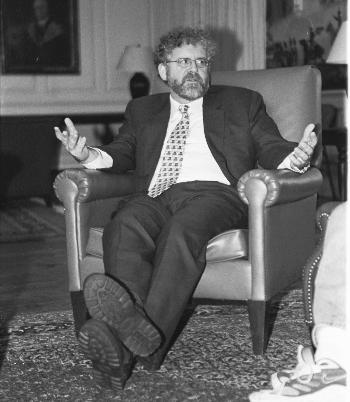
: Author WALTER R. MEAD discusses his recently published foreign policy book last night in Lowell House.
Weeks after the Institute of Politics (IOP) Book Club cancelled an appearance by an author critical of President Bush, the club held its first event yesterday.
Foreign policy expert Walter Russell Mead told a small group of students yesterday that while American foreign policy has often been flawed in theory, it has historically been successful in accomplishing its goals.
“The fact is that we stink at foreign policy, but over the years, we win,” said Mead, who is a senior fellow of U.S. policy at the Council for Foreign Relations and a contributing editor to the New York Times.
Mead’s discussion was the IOP Book Club’s first event this year. The series got a late start this fall due to the organizers’ desire after Sept. 11 not to have discussions criticizing President Bush.
Book Club coordinator Brian J. Wong ’03 said the group had planned to bring Mark Crispin Miller to discuss his book The Bush Dyslexicon: Observations on a National Disorder.
The Harvard Political Union, the student committee of the IOP that oversees the book series, voted to cancel Miller’s appearance.
“It was seen as inappropriate in the wake of Sept. 11 to criticize the Bush administration,” Wong said.
Eight students and three other members of the Harvard community attended yesterday’s event, which was held in the Lowell House Junior Common Room.
Mead discussed the many divergent criticisms of American foreign policy that he wrote about in his recently published book, Special Providence: American Foreign Policy and How it Changed the World.
“Just about everybody in the U.S. and abroad agrees that American foreign policy is terrible,” Mead said.
Mead cited the divided U.S. political system as the primary source of the nation’s problems with America’s foreign policy.
“It’s horrendous,” said Mead. “It’s controlled by contentious lobbies that focus on short-term and domestic goals.”
But Mead also said that the U.S. has had consistent success it achieving its foreign policy objectives.
“If international life was a game of Risk, we’re winning,” Mead said.
In his book, Mead argues that American foreign policy should be viewed not in terms of realist and idealist theories, but in terms of four schools of foreign policies tracing their histories to four leaders in American history.
According to Mead, the Hamiltonian school supports pragmatic and situational solutions, the Jacksonian school is populist and values military prowess, the Wilsonian school believes in a moral commitment to the rest of the world and the Jeffersonian school favors a limited degree of intervention.
“It’s like four people wrestling over the wheel that steers a ship,” Mead said.
Each school has its merits, he argued.
“Even the Jacksonian, that kind of cowboy diplomacy, has its value,” Mead said, citing the importance of people who took action to help people in the World Trade Center on Sept. 11.
Mead told students that the terrorist attacks of Sept. 11 have created a general consensus on foreign policy among the American public that has not existed since the breakup of the Soviet Union.
“Now, when the President wants to do a particular foreign policy, all he has to do is call it an anti-terror initiative,” he said.
The IOP provided interested students with free copies of Mead’s latest book.
Prior to the discussion, Mead informally discussed grade inflation, last spring’s Progressive Student Labor Movement sit-in and campus reactions to the war in Afghanistan.
Read more in News
Top Israeli Official Talks Policy












